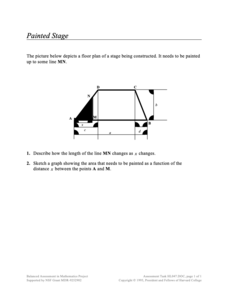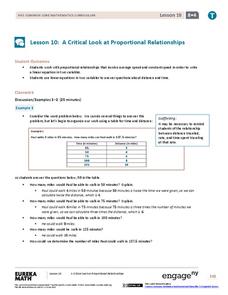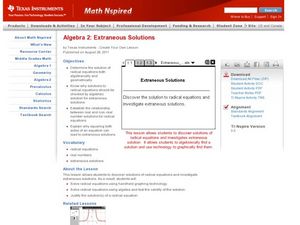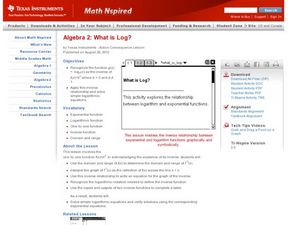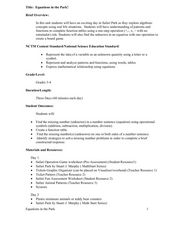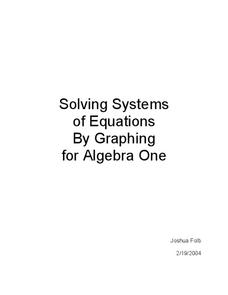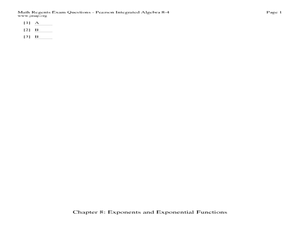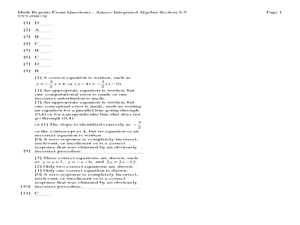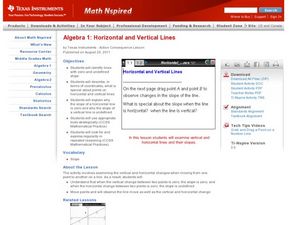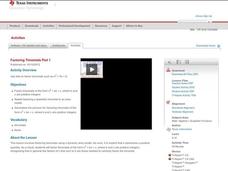Concord Consortium
Painted Stage
Find the area as it slides. Pupils derive an equation to find the painted area of a section of a trapezoidal-shaped stage The section depends upon the sliding distance the edge of the painted section is from a vertex of the trapezoid....
Mathematics Assessment Project
Modeling Motion: Rolling Cups
Connect the size of a rolling cup to the size of circle it makes. Pupils view videos of cups of different sizes rolling in a circle. Using the videos and additional data, they attempt to determine a relationship between cup...
EngageNY
A Critical Look at Proportional Relationships
Use proportions to determine the travel distance in a given amount of time. The 10th installment in a series of 33 uses tables and descriptions to determine a person's constant speed. Using the constant speed, pupils write a linear...
Curated OER
Laws of Exponents, Radicals
For this Algebra II worksheet, 11th graders solve problems involving the laws of exponents, including fractional exponents, solve radical equations, and graph radical functions. The ten page worksheet contains fifty-seven...
Curated OER
Polynomials: Factors, Roots and Zeroes
Students factor polynomial equations. In this algebra instructional activity, students identify the zeros of the equations. They use algebra to rewrite word problems using symbols.
Curated OER
Extraneous Solutions
Young scholars find the roots of quadratic equations. In this algebra lesson, students solve radical equations and identify the positive and negative roots. They graph and analyze their functions.
Curated OER
Maximum, Minimum, Increasing, Decreasing
Learners practice with the StudyCard set on assessing real-world contexts dealing with the concepts of maximum, minimum, increasing and decreasing. They view a variety of quadratic functions and equations with their TI-83 Plus calculators.
Curated OER
What is Log?
Young mathematicians differentiate between logs and natural logs in this algebra lesson. They solve functions and logarithmic functions. Learners also graph and rewrite the exponential and log functions.
Alabama Learning Exchange
I'm Lovin' It: Finding Area Between Curves
Students explore the concept of finding the area between two curves. In this finding the area between two curves instructional activity, students model the logos of McDonalds, Nike, and Motorola on grid paper. Students find functions to...
Curated OER
Exponential vs. Power
Pupils differentiate between exponential and power functions. They identify the base, exponent and properties of exponential functions. They also graph the functions using the TI calculator.
Curated OER
Equations in the Park
Young scholars explore algebraic concepts using real life situations. In this equations lesson, students develop strategies to solve missing number problems. Young scholars participate in a board game based on algebraic equations.
Curated OER
Solving Systems of Equations
Young scholars identify the quadrants and axis of a coordinate plane. In this algebra instructional activity, students discover the ocrrect way to graph using the coordinate plane. They discuss the relationship between x and y values,...
Curated OER
Solving Quadratic Equations
In this Algebra I/Algebra II learning exercise, students solve quadratic equations by graphing and by taking the square root of both sides. The two page learning exercise contains a combination five multiple choice and free...
Curated OER
Graphing the Solution Set of a System of Inequalities
In this Algebra I/Algebra II worksheet, students graph the solution set of a system of inequalities. The two page worksheet contains a combination five multiple choice and free response questions. Answers are included.
Curated OER
Laws of Exponents
In this Algebra I/Algebra II worksheet, students use the laws of exponents to solve problems involving zero and negative exponents. The one page worksheet contains six multiple choice questions. Answers are included.
Curated OER
Raising a Product to a Power
In this Algebra I/Algebra II worksheet, 10th graders use the laws of exponents to raise a product to a power. The one page worksheet contains three multiple choice questions. answers are included.
Curated OER
Solving Rational Equations
In this algebra worksheet, 11th graders solve rational expressions, by combining the denominators and making them common. They solve word problems using algebra. There are 10 questions with an answer key.
Curated OER
The Slope of Parallel and Perpendicular Lines
In this Algebra I/Algebra II worksheet, students examine slope to determine if the given lines are parallel or perpendicular. Students determine the equation of lines that are either parallel or perpendicular to the given...
Curated OER
Horizontal and Vertical Lines
Students solve equations and graph-their solutions. In this algebra lesson, students, identify the type of line using the slope of the equation. They graph and observe their lines.
Curated OER
Factoring Trinomials
Young scholars factor trinomials. In this algebra lesson, students identify the different integers making up the trinomial and use the special pattern to factor them. They continue to model the equations and how to factor correctly.
Curated OER
Himalayan Herds: Fractional Exponential Growth
Students solve problems by identifying exponential growth and decay and differentiating between patterns, relation and functions. In this algebra lesson, students apply concepts of exponential growth to solve problems.
Curated OER
Factoring Trinomials
Have the class factor and solve trinomials of integers in the form x2 + bx + c, where b and c are positive. They relate factoring to area and then follow a specific format to factor their trinomials. Tiles are used to help them...
Curated OER
Discriminant Testing
The class works to identify solutions using the discriminant.They use part of the quadratic formula to find the number of solutions a quadratic equation will have. They calculate how-many times the quadratic function will cut the x-axis....
Curated OER
Introduction to Tangent Lines using the TI-Nspire
Students make mathematical argument using the concept of Limit. In this algebra lesson, student calculate the instantaneous rate of change from the linear graph. They use a TI-calculator to create a visual of the graphs.


